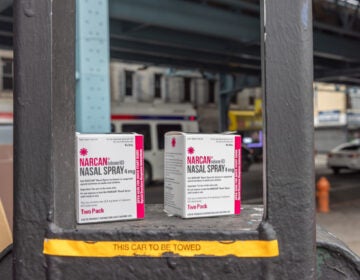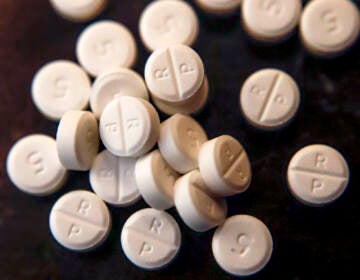New study rates Pa.’s opioid overdose death rate as sixth highest in the nation
Well Being Trust, a national foundation focused on the mental health of America, ranked Pennsylvania’s opioid overdose death rate as the sixth highest in the nation.

A casket is carried up Kensington Avenue Thursday during the March in Black in remembrance of those who have died of opioid overdoses in the Philadelphia region. (Brad Larrison for NewsWorks)
With more than 1,200 people expected to die from an overdose in Philadelphia alone this year, it may not be surprising that a new study by Well Being Trust, a national foundation focused on the mental health of America, ranked Pennsylvania’s opioid overdose death rate as the sixth highest in the nation. The state’s death rates from alcohol are the sixth lowest.
Benjamin Miller, policy director at Well Being Trust says the difference in the two categories comes down to how state laws and regulations apply evidence-based practices. “Pennsylvania has done some innovative things. And how do you take those innovations and scale them so that you kind of get the same trends around opioids as you have with alcohol?,” said Miller.
In the past decade, the rate of deaths from drug overdoses have tripled nationwide, while alcohol induced deaths and suicide continue to climb. The study outlines 60 practices for states to improve their outcomes in these categories.
“It’s not just identify more and hope that things get better,” said Miller. “It’s how do we increase the number of folks that receive treatment? How do we insure that their treatment is connected so that it’s not fractured and frustrating,” he continued.
Some programs where Pennsylvania is highlighted as a model for other states includes the pilot Rural Health Model that employs a budget with set prices for inpatient and outpatient programs to streamline services and keep costs low. SafeStart, an early Head Start program in Allentown for babies under three years old with parents struggling with substance abuse, is also mentioned as a proactive solution.
The study’s suggestions for Pennsylvania include laws supporting clean needle exchanges, comprehensive anti-bullying laws, and an Earned Income Tax credit to support low income families.
Overall, Miller says it shows the need for mental health care to be integrated into everyday healthcare. “Until we recognize that mental health and substance use is just as much a part of health as your blood pressure, then we are failing our communities because we continue to treat them as pieces and not wholes,” he said.
WHYY is your source for fact-based, in-depth journalism and information. As a nonprofit organization, we rely on financial support from readers like you. Please give today.





